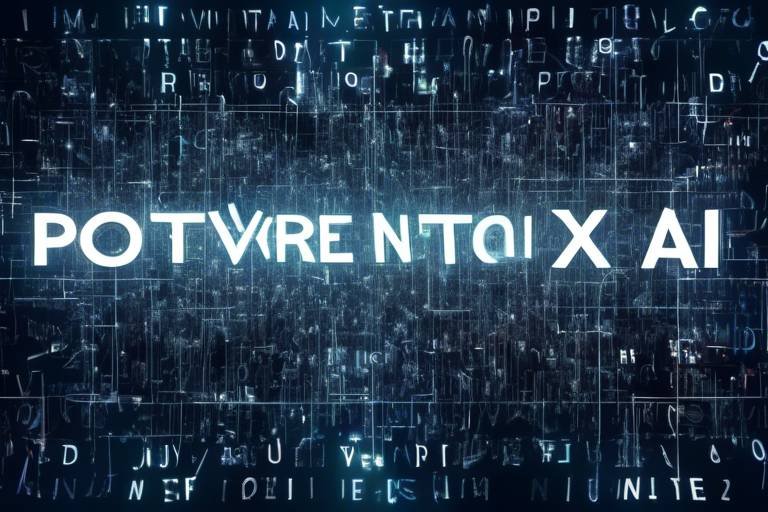Revamping AI Strategies with Ethical Interventions
In a world where technology is advancing at breakneck speed, the integration of ethical considerations into artificial intelligence (AI) strategies has become not just important, but essential. As organizations increasingly rely on AI for decision-making, the potential for unintended consequences grows. This is where ethical interventions come into play, serving as a guiding light to navigate the murky waters of AI deployment. By embedding ethics into AI strategies, companies can not only enhance their accountability, fairness, and transparency but also build a stronger bond of trust with their users. Imagine AI as a powerful tool—like a double-edged sword—capable of creating incredible efficiencies while also posing significant risks if not handled responsibly. Therefore, revamping AI strategies with ethical interventions is not just a choice; it’s a necessity for sustainable growth and societal good.
The conversation around ethical AI isn't just about compliance or ticking boxes; it’s about fundamentally reshaping how we think about technology. Organizations must ask themselves: Are we developing AI that respects human rights? Are we ensuring that our algorithms do not perpetuate bias? By addressing these questions, businesses can create a framework that not only meets legal standards but also resonates with the values of their customers. This proactive approach will be critical in a future where consumers are more informed and discerning about the technologies they engage with.
To effectively implement ethical interventions, organizations can adopt various frameworks that guide them through the complexities of ethical AI. These frameworks serve as blueprints, ensuring that ethical considerations are woven into every stage of the AI lifecycle—from development to deployment. For instance, principles such as fairness, accountability, and transparency should be at the forefront of these frameworks, guiding organizations in their decision-making processes. The goal is to foster public trust while mitigating risks associated with AI misuse.
However, the journey to ethical AI is not without its challenges. Organizations often encounter resistance to change, a lack of expertise, and the inherent complexity of integrating ethical considerations into existing workflows. Overcoming resistance requires effective communication and education, emphasizing the long-term benefits of ethical AI for both the organization and society at large. Furthermore, the shortage of professionals skilled in both AI and ethics necessitates investment in training and development, ensuring that the workforce is equipped to tackle these critical issues.
As we look to the future, several trends are emerging that will shape the landscape of ethical AI practices. Regulatory frameworks are being developed to provide guidelines for ethical AI use, while interdisciplinary collaboration is becoming increasingly important. Public engagement will also play a vital role, as stakeholders demand transparency and accountability from organizations deploying AI technologies. By staying ahead of these trends, organizations can not only enhance their ethical AI strategies but also position themselves as leaders in a rapidly evolving technological landscape.
- What is ethical AI? Ethical AI refers to the practice of developing and deploying artificial intelligence systems in a manner that adheres to ethical principles, ensuring fairness, accountability, and transparency.
- Why is ethical AI important? Ethical AI is crucial for building trust with users, mitigating risks, and ensuring that AI technologies do not perpetuate bias or discrimination.
- What frameworks exist for implementing ethical AI? Various frameworks provide structured approaches to assess and address ethical implications throughout the AI lifecycle, focusing on principles like fairness, accountability, and transparency.
- What challenges do organizations face in adopting ethical AI? Common challenges include resistance to change, a lack of expertise, and the complexity of integrating ethical considerations into existing workflows.
- What future trends should we expect in ethical AI? Emerging trends include the development of regulatory frameworks, increased interdisciplinary collaboration, and greater public engagement in AI ethics.

The Importance of Ethical AI
In our rapidly advancing technological landscape, the significance of ethical AI cannot be overstated. As artificial intelligence systems become increasingly integrated into our daily lives, from healthcare to finance, the need for responsible development and deployment has never been more critical. Imagine a world where AI systems operate without ethical guidelines; the potential for misuse and harm would be staggering. Therefore, understanding the importance of ethical AI is essential for organizations aiming to build trust with users and mitigate risks.
Ethical AI is not just a buzzword; it's a necessity. Organizations that prioritize ethical considerations in their AI strategies can foster a culture of accountability and transparency, leading to better decision-making processes. By doing so, they can enhance public trust, which is crucial in an era where skepticism about technology is on the rise. When users feel that AI systems are designed with their best interests in mind, they are more likely to embrace these technologies rather than fear them.
Moreover, implementing ethical AI practices can help organizations avoid potential pitfalls associated with bias and discrimination. For instance, an AI system trained on biased data can lead to unfair outcomes, affecting marginalized communities disproportionately. By prioritizing fairness in AI development, organizations can ensure that their systems serve all users equitably. This approach not only aligns with ethical standards but also enhances the overall effectiveness of AI applications.
The integration of ethical AI can also serve as a competitive advantage. As consumers become more aware of the implications of AI technologies, they are more likely to choose brands that demonstrate a commitment to ethical practices. In fact, a recent survey indicated that 70% of consumers would be willing to pay more for products from companies that prioritize ethical AI. This statistic underscores the potential for ethical AI to drive business success while promoting social good.
In conclusion, the importance of ethical AI extends beyond mere compliance with regulations; it encompasses a holistic approach to technology that prioritizes human values and societal well-being. As organizations navigate the complexities of AI implementation, embedding ethical considerations into their strategies will not only mitigate risks but also pave the way for a more equitable future. The question then arises: can your organization afford to ignore the ethical implications of AI?

Frameworks for Ethical AI Implementation
In the rapidly evolving landscape of artificial intelligence, serve as essential blueprints that guide organizations in navigating the complex ethical terrain. These frameworks are not just mere guidelines; they are comprehensive methodologies designed to help organizations assess, implement, and monitor ethical considerations throughout the entire AI lifecycle. By adopting these frameworks, companies can ensure that their AI systems are not only effective but also responsible and aligned with societal values.
One of the most recognized frameworks is the AI Ethics Guidelines developed by various international organizations, which emphasize core principles such as fairness, accountability, and transparency. These guidelines provide a structured approach to evaluate AI systems, ensuring that ethical considerations are integrated from the inception of AI projects. For instance, the European Commission has laid out specific recommendations that encourage organizations to develop AI systems that respect fundamental rights and promote democratic values.
Another important framework is the Responsible AI Framework, which focuses on embedding ethical principles into the organizational culture. This framework advocates for a multi-disciplinary approach, involving stakeholders from various fields, including ethics, law, and technology. By fostering collaboration among these diverse groups, organizations can identify potential ethical pitfalls early in the development process. This proactive approach not only mitigates risks but also enhances the overall quality and trustworthiness of AI systems.
Moreover, organizations can adopt the AI Ethics Impact Assessment, which acts as a vital tool for evaluating the potential ethical implications of AI projects before they are fully deployed. This assessment involves a thorough analysis of the data used, the algorithms implemented, and the anticipated outcomes to ensure that ethical standards are upheld. Through this process, companies can identify biases and unintended consequences that may arise, allowing them to make necessary adjustments before the technology reaches the end-users.
To illustrate the significance of these frameworks, consider the following table that summarizes key components of ethical AI frameworks:
| Framework | Key Focus Areas | Benefits |
|---|---|---|
| AI Ethics Guidelines | Fairness, Accountability, Transparency | Structured evaluation and alignment with societal values |
| Responsible AI Framework | Multi-disciplinary collaboration | Enhanced quality and trustworthiness of AI systems |
| AI Ethics Impact Assessment | Evaluation of ethical implications | Early identification of biases and risks |
In conclusion, implementing ethical AI frameworks is not merely a compliance exercise; it is a strategic necessity that can significantly enhance an organization's reputation and operational effectiveness. By prioritizing ethics in AI development, companies can foster trust among users, mitigate risks, and contribute positively to society. As we move forward, it is imperative for organizations to continually refine these frameworks, adapting them to the ever-changing landscape of technology and ethics.
- What is ethical AI? Ethical AI refers to the practice of designing and implementing artificial intelligence systems that align with ethical principles, such as fairness, accountability, and transparency.
- Why are frameworks important for ethical AI? Frameworks provide structured approaches to assess and address ethical implications, ensuring that organizations can implement AI responsibly and build trust with users.
- How can organizations ensure fairness in AI? Organizations can ensure fairness by conducting data audits, implementing algorithmic transparency, and regularly evaluating their AI systems for biases.
- What challenges do organizations face in adopting ethical AI? Common challenges include resistance to change, lack of expertise in ethical AI, and the complexity of integrating ethical considerations into existing workflows.

Principles of Ethical AI
The principles of ethical AI are the guiding stars that illuminate the path toward responsible and fair artificial intelligence systems. These principles—fairness, accountability, and transparency—form the bedrock upon which organizations can build trust and integrity in their AI initiatives. Imagine embarking on a journey without a map; that's what implementing AI without these principles feels like. They not only help in navigating the complex landscape of AI but also ensure that the technology serves humanity rather than undermines it.
To delve deeper, let's break down these core principles:
- Fairness: This principle aims to eliminate bias in AI algorithms. It’s essential for ensuring that AI systems treat all users equitably. For instance, if an AI system is used in hiring processes, it must be designed to avoid discrimination based on gender, race, or any other irrelevant factor. Fairness is not merely a checkbox; it’s a commitment to creating systems that reflect the diversity of the society they serve.
- Accountability: With great power comes great responsibility. Organizations must own the outcomes of their AI systems. This means that if an AI makes a decision that leads to negative consequences, the organization should be held accountable. Establishing clear lines of responsibility helps to foster a culture of ethical behavior and compliance with regulations, which is crucial in maintaining public trust.
- Transparency: Imagine trying to understand a black box that controls critical decisions in your life. Frustrating, right? Transparency ensures that users can see how decisions are made by AI systems. When organizations provide insights into their algorithms and data usage, it not only demystifies the technology but also builds user confidence. Users are more likely to trust a system when they understand its workings.
Incorporating these principles into AI development is not just a good practice; it’s a necessity for fostering a healthy relationship between technology and society. By adhering to the principles of ethical AI, organizations can mitigate risks and enhance their reputation, ultimately leading to better user engagement and satisfaction. Furthermore, ethical AI practices can serve as a competitive advantage in a market increasingly focused on corporate responsibility.
As we move forward, it’s crucial to remember that these principles are not static. They require ongoing evaluation and adaptation as technology evolves and societal norms shift. The landscape of AI is ever-changing, and organizations must remain vigilant to ensure that their AI practices align with the highest ethical standards.
Q1: Why is fairness important in AI?
A1: Fairness in AI is crucial because it helps prevent bias and discrimination, ensuring that all individuals are treated equitably regardless of their background. This promotes social justice and trust in AI systems.
Q2: How can organizations ensure accountability in AI?
A2: Organizations can ensure accountability by establishing clear governance structures, documenting decision-making processes, and being transparent about the outcomes of their AI systems.
Q3: What role does transparency play in user trust?
A3: Transparency builds user trust by providing insights into how AI systems function and make decisions. When users understand the workings of AI, they are more likely to accept and rely on its outcomes.
Q4: How can organizations overcome challenges in adopting ethical AI?
A4: Organizations can overcome challenges by investing in training, fostering a culture of ethical awareness, and engaging in open dialogues about the importance of ethical AI practices.

Fairness in AI Algorithms
In the ever-evolving landscape of artificial intelligence, ensuring fairness in AI algorithms is not just a technical necessity; it's a moral imperative. Imagine a world where AI systems inadvertently perpetuate bias, leading to unfair treatment of individuals based on characteristics such as race, gender, or socioeconomic status. This scenario is not just hypothetical; it has happened before, and the consequences can be devastating. For instance, biased algorithms in hiring processes have led to qualified candidates being overlooked simply due to flawed data inputs. Therefore, it’s crucial for organizations to implement robust strategies that promote fairness in their AI systems.
One effective way to achieve fairness is through data auditing. This involves a thorough examination of the datasets used to train AI models. By identifying and rectifying any biases present in the data, organizations can significantly reduce the risk of discriminatory outcomes. Data auditing can be likened to a mechanic inspecting a car before a long journey; if you don’t check the engine and tires, you might end up stranded on the side of the road. Similarly, without proper data audits, AI systems can lead to unexpected and harmful results.
Another critical aspect of ensuring fairness is algorithmic transparency. This means making the workings of AI algorithms clear and understandable to users and stakeholders. When organizations openly share how their algorithms function, they demystify the technology and foster trust among users. For example, if a loan approval algorithm can explain why a particular application was denied, it allows applicants to understand the decision-making process, thus promoting fairness. Transparency acts as a spotlight, illuminating the path to equitable outcomes.
To further illustrate the importance of fairness in AI, consider the following table that outlines common biases found in AI algorithms and their potential impacts:
| Type of Bias | Description | Potential Impact |
|---|---|---|
| Data Bias | Occurs when the training data is not representative of the population. | Leads to skewed predictions and decisions. |
| Algorithmic Bias | Results from flawed algorithm design or parameter settings. | Can reinforce existing stereotypes and inequalities. |
| Feedback Loop Bias | Occurs when biased outputs influence future inputs. | Exacerbates inequality over time. |
Addressing these biases requires a proactive approach. Organizations must invest in continuous monitoring and improvement of their AI systems. This is where the concept of ethical AI governance comes into play. By establishing clear guidelines and accountability measures, companies can ensure that their AI algorithms operate fairly and responsibly. Much like a ship needs a captain to steer it through stormy seas, ethical governance provides direction and purpose, ensuring that AI technologies serve society positively.
In conclusion, fairness in AI algorithms is not merely a checkbox on a compliance form; it’s a fundamental aspect of responsible AI development. Organizations that prioritize fairness will not only avoid potential pitfalls but also build a reputation for integrity and trustworthiness in an increasingly skeptical world. As we move forward, the call for fair AI will only grow louder, and those who heed this call will lead the way into a more equitable future.

Accountability in AI Systems
Establishing accountability in AI systems is not just a regulatory checkbox; it's a fundamental necessity for ethical AI deployment. Imagine if every decision made by an AI system was shrouded in mystery—who would take responsibility when things go wrong? In a world where AI influences critical sectors like healthcare, finance, and law enforcement, the stakes are incredibly high. Thus, organizations must implement robust accountability frameworks that ensure responsible AI usage.
One effective way to cultivate accountability is through the creation of clear guidelines that delineate roles and responsibilities. This can involve:
- Designating Accountability Officers: Appoint individuals who are responsible for overseeing AI implementations and ensuring compliance with ethical standards.
- Conducting Regular Audits: Regularly reviewing AI systems to assess their performance and adherence to ethical guidelines can help identify areas for improvement.
- Establishing Feedback Mechanisms: Creating channels for users to report issues or concerns regarding AI decisions fosters a culture of transparency and responsiveness.
Moreover, organizations should focus on developing a culture that prioritizes ethical considerations. This means integrating ethical training into the onboarding process for new employees and conducting ongoing workshops for existing staff. When employees understand the importance of accountability, they're more likely to take it seriously in their daily operations.
Another critical aspect is the documentation of AI decision-making processes. By keeping detailed records of how decisions are made, organizations can create a trail that can be followed in the event of disputes or ethical dilemmas. This not only enhances accountability but also aids in building trust with users. When people know that there is a system in place that can explain how decisions are made, they are more likely to feel confident in the technology.
In conclusion, accountability in AI systems is not merely a good practice; it's an essential component of ethical AI deployment. By establishing clear roles, conducting audits, fostering a culture of ethics, and maintaining comprehensive documentation, organizations can ensure that they are not only compliant but also trusted by their users. After all, in the rapidly evolving landscape of AI, accountability is the bedrock upon which responsible innovation stands.
Q: Why is accountability important in AI systems?
A: Accountability ensures that organizations take responsibility for the decisions made by AI, fostering trust and ethical behavior.
Q: What are some methods to enhance accountability in AI?
A: Methods include designating accountability officers, conducting regular audits, and establishing feedback mechanisms.
Q: How can organizations cultivate a culture of accountability?
A: By integrating ethical training into onboarding and ongoing education, organizations can emphasize the importance of accountability.
Q: What role does documentation play in AI accountability?
A: Documentation provides a clear record of decision-making processes, which helps in addressing disputes and building user trust.

Transparency and Explainability
When it comes to artificial intelligence, transparency and explainability are more than just buzzwords; they are essential pillars that support user trust and ethical practices. Imagine driving a car with a complex engine but no manual to explain how it works. You might feel uneasy, right? This analogy holds true for AI systems. Users need to understand how these systems make decisions to feel comfortable relying on them. Transparency involves revealing how algorithms function, what data they use, and the processes behind their decision-making. In contrast, explainability refers to the ability to clarify these processes in a way that is understandable to the average user.
One of the main challenges in AI today is the so-called "black box" phenomenon, where users have no insight into how decisions are made. This lack of visibility can lead to skepticism and mistrust. By providing clear insights into how AI systems operate, organizations can help users grasp the rationale behind decisions, whether it’s a loan approval, a job application, or a medical diagnosis. This is not just about compliance; it’s about creating a culture of trust. When users feel informed, they are more likely to embrace AI technologies, leading to better adoption rates and overall satisfaction.
To achieve transparency and explainability, organizations can implement several strategies:
- Documentation: Maintain comprehensive documentation that outlines the AI model's design, data sources, and decision-making processes.
- Visualization Tools: Utilize tools that visually represent how data flows through algorithms, making complex processes easier to understand.
- User-Friendly Interfaces: Develop interfaces that allow users to query AI systems and receive understandable explanations for decisions.
Moreover, regulatory bodies are increasingly emphasizing the need for transparency in AI. As new laws and guidelines emerge, organizations must adapt to these expectations. By proactively embracing transparency and explainability, companies not only adhere to regulations but also position themselves as leaders in ethical AI practices. This proactive approach can enhance brand reputation and customer loyalty.
In conclusion, transparency and explainability are not optional; they are vital components of ethical AI. By committing to these principles, organizations can foster an environment of trust and accountability, paving the way for responsible AI development and deployment. As we move forward in this technology-driven era, let’s remember that the more we understand AI, the more we can harness its potential for good.
- What is the difference between transparency and explainability in AI? Transparency refers to how open an organization is about its AI processes, while explainability focuses on how well those processes can be understood by users.
- Why is transparency important in AI? Transparency builds trust with users, ensuring they feel safe and informed about the decisions made by AI systems.
- How can organizations improve transparency in AI? Organizations can improve transparency by documenting processes, using visualization tools, and creating user-friendly interfaces.

Challenges in Ethical AI Adoption
Adopting ethical AI practices is no walk in the park. Organizations often find themselves navigating a complex landscape filled with various hurdles that can impede progress. One of the most significant challenges is the resistance to change. People are naturally inclined to stick with what they know, and when it comes to AI, many stakeholders may feel uneasy about altering established workflows. This resistance can stem from a lack of understanding of ethical AI's importance, leading to a reluctance to embrace new methodologies. To combat this, organizations need to engage in effective communication and education, illustrating the long-term benefits of ethical AI not just for the organization, but for society as a whole.
Another major challenge is the lack of expertise in the intersection of AI and ethics. The rapid pace of AI development has outstripped the availability of professionals who are well-versed in both fields. This shortage can lead to poorly informed decisions that might overlook critical ethical considerations. Organizations must invest in training and development programs to cultivate a workforce capable of addressing these challenges. By doing so, they can ensure that their teams are equipped with the necessary skills to implement ethical AI practices effectively.
Moreover, the complexity of integrating ethical considerations into existing workflows cannot be underestimated. Many organizations have established systems and processes that may not easily accommodate the additional layer of ethical scrutiny. This complexity can lead to a sense of overwhelm, causing organizations to shy away from making necessary changes. To tackle this issue, it’s essential for companies to adopt a phased approach to integration. This could involve starting with pilot projects that allow teams to experiment with ethical AI practices before rolling them out on a larger scale.
In summary, while the road to ethical AI adoption is fraught with challenges, it is a journey worth undertaking. By addressing resistance to change, investing in expertise, and simplifying integration processes, organizations can pave the way for a future where AI is not just powerful, but also ethical. The key lies in recognizing these obstacles and actively working to overcome them, creating a more responsible and transparent AI landscape.
- What are the main challenges organizations face in adopting ethical AI?
Organizations often encounter resistance to change, a lack of expertise in AI and ethics, and the complexity of integrating ethical considerations into existing workflows. - How can organizations overcome resistance to change?
Effective communication and education about the benefits of ethical AI can help stakeholders understand its long-term value. - Why is there a lack of expertise in ethical AI?
The rapid advancement of AI technology has outpaced the availability of professionals who are skilled in both AI and ethical considerations. - What can organizations do to simplify the integration of ethical AI?
A phased approach, starting with pilot projects, can help teams experiment with ethical AI practices before wider implementation.

Resistance to Change
Change is often met with resistance, and the integration of ethical AI practices is no exception. Many organizations grapple with the challenge of shifting their existing paradigms to embrace ethical considerations in artificial intelligence. This resistance can stem from various sources, including fear of the unknown, a lack of understanding, and the perceived complexity of implementing new strategies. It's akin to trying to convince a child to eat their vegetables; they may not see the benefits immediately and may resist simply because it's different from what they know.
To effectively tackle this resistance, organizations need to prioritize communication and education. Stakeholders must be informed about the long-term benefits of ethical AI, not just for the company but for society as a whole. For instance, when employees understand that ethical AI can lead to greater user trust and, consequently, a stronger market position, they may be more inclined to support the transition. It's crucial to highlight how ethical AI can contribute to a more equitable society, which can resonate on a personal level for many individuals.
Moreover, fostering an environment of collaboration can significantly reduce resistance. When team members are involved in discussions about ethical AI, they feel a sense of ownership over the changes being made. This can be achieved through workshops, training sessions, and open forums where employees can voice their concerns and suggestions. By actively engaging with the workforce, organizations can demystify ethical AI and showcase its relevance to their daily operations.
Another effective strategy is to implement pilot programs that allow employees to experiment with ethical AI practices on a smaller scale before full implementation. These programs can serve as a testing ground, enabling teams to see firsthand the benefits and challenges of ethical AI without the pressure of a company-wide rollout. By providing a safe space for exploration, organizations can ease the transition and build confidence among their staff.
Ultimately, overcoming resistance to change is about creating a culture that values ethics in technology. When organizations make a concerted effort to communicate the importance of ethical AI, educate their teams, and involve them in the process, they can foster a more supportive environment. Just as a well-tended garden flourishes, so too will an organization that nurtures its commitment to ethical AI.
- Why is ethical AI important? Ethical AI is crucial for ensuring that AI systems are fair, accountable, and transparent, which helps build trust with users and mitigates risks associated with bias and discrimination.
- What are the main challenges in adopting ethical AI? Major challenges include resistance to change, lack of expertise, and the complexity of integrating ethical considerations into existing workflows.
- How can organizations overcome resistance to change? Effective communication, education, collaboration, and pilot programs can help reduce resistance and promote acceptance of ethical AI practices.
- What are some principles of ethical AI? Core principles include fairness, accountability, and transparency, which guide organizations in their ethical decision-making processes.

Lack of Expertise
The rapid advancement of artificial intelligence (AI) presents an exciting frontier for innovation, but it also brings to light a significant challenge: the in both AI technologies and ethical considerations. Imagine trying to navigate a complex maze without a map; that’s what many organizations face when attempting to implement ethical AI practices. The intersection of ethics and technology requires a unique skill set that is still in its infancy. Many professionals are well-versed in AI development but may lack a foundational understanding of ethical principles, which is crucial for responsible AI deployment.
To tackle this issue, organizations must recognize that investing in knowledge and skills is not just beneficial but essential. This could involve providing training programs that focus on the ethical implications of AI, ensuring that employees are equipped to handle the moral dilemmas that may arise. A workforce that understands both the technical and ethical dimensions can better navigate the complexities of AI implementation, leading to more responsible outcomes. For instance, offering workshops that combine AI programming with ethical discussions can foster a culture of awareness and accountability.
Moreover, organizations can benefit from collaborating with academic institutions and ethical think tanks. By partnering with these entities, companies can tap into a wealth of knowledge and resources, bridging the gap between technology and ethics. This collaboration can lead to the development of comprehensive training modules that prepare employees for the challenges they will face in the real world. In essence, it’s about creating a synergy between technology and ethics, ensuring that the workforce is not only skilled in AI but also in understanding the broader implications of their work.
In addition, organizations can consider establishing internal teams dedicated to ethical AI oversight. These teams can consist of diverse professionals, including ethicists, data scientists, and legal experts, who can work together to evaluate AI projects and ensure they align with ethical standards. This collaborative approach not only enhances the organization’s ethical framework but also provides a platform for ongoing education and dialogue about the importance of ethics in AI.
Ultimately, addressing the lack of expertise in ethical AI is a multi-faceted challenge that requires commitment and proactive measures. By investing in training, fostering collaborations, and establishing dedicated teams, organizations can build a robust foundation for ethical AI practices. This not only helps mitigate risks but also positions them as leaders in the responsible use of technology, earning the trust of users and stakeholders alike.
- What is ethical AI? Ethical AI refers to the development and implementation of artificial intelligence systems that prioritize fairness, accountability, and transparency.
- Why is there a lack of expertise in ethical AI? The rapid evolution of AI technology has outpaced the development of ethical frameworks and training programs, leading to a shortage of professionals skilled in both areas.
- How can organizations improve their expertise in ethical AI? Organizations can invest in training programs, collaborate with academic institutions, and establish internal teams focused on ethical oversight.
- What are the benefits of ethical AI? Ethical AI fosters trust among users, mitigates risks of bias and discrimination, and ensures compliance with regulations.

Future Trends in Ethical AI
As we look ahead, the landscape of artificial intelligence (AI) is rapidly evolving, and with it, the importance of ethical considerations becomes even more pronounced. The future of ethical AI is not just about compliance; it’s about creating a framework that fosters innovation while ensuring that technology serves humanity positively. One of the most significant trends is the establishment of regulatory frameworks that will guide the ethical development and deployment of AI technologies. Governments and organizations worldwide are beginning to understand that without proper regulations, the potential for misuse and harm is substantial. This is akin to the way traffic laws were established to ensure safety on the roads—without them, chaos would reign.
Another emerging trend is interdisciplinary collaboration. The complexities of AI ethics require insights from various fields, including law, sociology, psychology, and technology. By bringing together experts from these diverse backgrounds, organizations can develop more holistic approaches to ethical AI. For instance, a tech company might partner with ethicists to evaluate the societal impacts of their algorithms, ensuring that the technology is not only innovative but also socially responsible. This collaborative approach can lead to more robust solutions that address the multifaceted challenges posed by AI.
Moreover, public engagement is becoming increasingly essential. As AI technologies permeate everyday life, it is vital to involve the public in discussions about ethical implications and societal impacts. This could take the form of community forums, surveys, or digital platforms where individuals can voice their concerns and suggestions regarding AI technologies. By fostering an open dialogue, organizations can build trust and ensure that their AI systems align with the values and expectations of society. After all, if the end-users are not on board, even the most advanced AI systems can fail to gain acceptance.
In addition to these trends, we can expect to see a rise in ethical AI certifications. Just as organic food or fair-trade products are certified, AI systems may soon require ethical certifications to assure users that they meet specific ethical standards. This could create a competitive market where organizations strive to prove their commitment to ethical practices, much like the race to achieve sustainability in various industries today. Such certifications could become a pivotal factor in consumer choice, influencing purchasing decisions and fostering a culture of accountability.
Ultimately, the future of ethical AI will hinge on a combination of these trends, creating a dynamic ecosystem where innovation and responsibility coexist. As technology continues to advance, it’s crucial for organizations to stay ahead of the curve by adopting ethical practices that not only comply with regulations but also resonate with the core values of society. The road ahead may be challenging, but the potential for positive change is immense.
- What is ethical AI? Ethical AI refers to the development and implementation of artificial intelligence systems that prioritize fairness, accountability, transparency, and respect for human rights.
- Why is ethical AI important? Ethical AI is crucial because it helps mitigate risks, prevents discrimination, and builds trust between technology providers and users, ensuring responsible AI deployment.
- What are some challenges in adopting ethical AI? Organizations may face challenges such as resistance to change, lack of expertise, and difficulties in integrating ethical considerations into existing workflows.
- How can organizations ensure fairness in AI? Techniques such as data auditing, algorithmic transparency, and inclusive data collection can help organizations achieve fairness in their AI systems.
- What role does public engagement play in ethical AI? Public engagement is essential for understanding societal concerns and expectations, ensuring that AI technologies align with the values of the community.
Frequently Asked Questions
- What is ethical AI and why is it important?
Ethical AI refers to the integration of moral principles into the development and deployment of artificial intelligence systems. It's crucial because it helps organizations build trust with users, mitigate risks, and ensure responsible AI practices that respect human rights and societal values.
- What are some key frameworks for implementing ethical AI?
There are several frameworks that organizations can adopt, including the Fairness, Accountability, and Transparency (FAT) framework, as well as the AI Ethics Guidelines provided by various regulatory bodies. These frameworks guide organizations in assessing ethical implications throughout the AI lifecycle.
- How can organizations ensure fairness in AI algorithms?
To ensure fairness, organizations can implement techniques such as data auditing, which involves examining datasets for bias, and algorithmic transparency, which provides insights into how algorithms make decisions. These practices help in achieving equitable outcomes and reducing discrimination.
- What does accountability in AI systems entail?
Accountability in AI systems involves establishing mechanisms that hold organizations responsible for the decisions made by their AI. This includes creating clear lines of responsibility and ensuring compliance with ethical standards and regulations, promoting ethical behavior throughout the organization.
- Why is transparency and explainability important in AI?
Transparency and explainability are vital for fostering user trust in AI technologies. When users understand how AI systems operate and the rationale behind their decisions, they are more likely to accept and rely on these technologies, leading to better user experiences.
- What challenges do organizations face when adopting ethical AI?
Organizations often encounter challenges such as resistance to change, a lack of expertise in ethical AI practices, and the complexity of integrating ethical considerations into existing workflows. Addressing these challenges requires effective communication, education, and investment in training.
- How can organizations overcome resistance to change regarding ethical AI?
Overcoming resistance to change involves effective communication strategies that highlight the long-term benefits of ethical AI. Educating stakeholders about how ethical AI can enhance organizational value and societal good is essential in fostering acceptance and support.
- What future trends should we expect in ethical AI?
Future trends in ethical AI include the development of regulatory frameworks, increased interdisciplinary collaboration, and greater public engagement in discussions about AI ethics. These trends will shape how organizations approach ethical considerations in AI as technology continues to evolve.



















